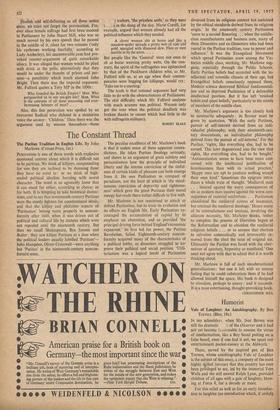The Const ant Thread
The Puritan Tradition in English Life. By John Marlowe. (Cresset Press, 16s.)
PURITANISM is one of those words with explosive emotional content about which it is difficult not to be partisan. We think of killjoys, compounding for sins they are inclined to by damning those they have no mind to : or we think of high- souled political idealists bursting with moral character. The word is so agreeably loose that it can stand for either, according to choice; or for both. It is tempting to take historical distinc- tions, and to say that seventeenth-century Puritans were the sturdy fighters for constitutional ideals, and that the killjoy and philistine aspects of 'Puritanism' belong more properly to noncon- formity after 1660, when it was driven out of political and cultural life by statutes which were not repealed until the nineteenth century. But then we recall Shakespeare, Ben Jonson and Butler : they saw killjoy Puritans at a time when the political leaders usually labelled `Puritans'— John Hampden, Oliver Cromwell—were anything but 'Puritan' in the nineteenth-century noncon- formist sense.
The peculiar excellence of Mr. Marlowe's book is that it makes sense of these apparent contra- dictions. He takes Puritan theology seriously, and shows in an argument of great subtlety and persuasiveness how the principle of individual liberty and the intense conviction of the sinful- ness of certain kinds of pleasure can both emerge from it. He sees Puritanism as compact of paradoxes, not the least of which is 'the simul- taneous conviction of depravity and righteous- ness' which gave the great Puritans their moral energy but made them rather difficult to live with.
Mr. Marlowe is not concerned to attack or defend Puritanism, but to trace its evolution and its effects on English life. Early Puritanism en- couraged the accumulation of capital by its emphasis on abstention, and so provided 'the principal driving force behind England's economic expansion.' Its first bid for power, the Puritan Revolution, failed. Eighteenth-century noncon- formity acquired many of the characteristics of a political lobby, as dissenters struggled to im- prove their political and social position. 'Utili- tarianism was a logical result of Puritanism divorced from its religious content but sustained by the ethical standards derived from its religious origin.' In the nineteenth century Puritanism `came to a second flowering ... when the middle- class manufacturers and business men, many of them Dissenters and ex-Dissenters who had been reared in the Puritan tradition, rose to power and influence.' It was the Evangelical Movement which spread Puritanism anew among the Vic- torian middle class, working, Mr. Marlowe sug- gests, especially through the Public Schools. Early Puritan beliefs had accorded with the in- tellectual and scientific climate of their age, but Evangelical beliefs consciously opposed them. Modern science destroyed Biblical fundamental- ism and so deprived Puritanism of a defensible intellectual position. But it has left 'residual habits and quasi-beliefs,' particularly in the minds of members of the middle class.
Mr. Marlowe's argument is too closely knit to summarise adequately : its flavour must be given by quotation. 'With the early Puritani, pursuit of self-interest derived from an indi- vidualist philosophy; with their nineteenth-cen- tury descendants, an individualist philosophy derived from the pursuit of self-interest.' For the Puritan, 'rights, like everything else, had to be earned. This later degenerated into the view that rights, like everything else, had to be bought.' 'Antinomianism seems to have been more con- cerned with the intellectual justification of licentiousness than with its actual practice.' 'Happy men are apt to produce nothing except their own kind.' Sometimes the epigram intro- duces a whole train of thought. `Mediaeval man . . . insured against the worst consequences of sin as modern man insures against the worst con- sequences of material misfortune. . . . Puritanism abandoned the mediaeval system of insurance, but retained the medieval theology.' Hence many of its contradictions and tensions, involving the ultimate necessity, Mr. Marlowe thinks, 'either to complete the process of liberation begun at the Reformation and to abandon the mediaeval religious beliefs . . . or to assume that election to salvation automatically and irrevocably re- moved from the elect the taint of original sin. Ultimately the Puritan was faced with the alter- natives of apostasy, hypocrisy or sainthood.' One need not agree with that to admit that it is worth thinking about.
Mr. Marlowe is full of such unsubstantiated generalisations : but one is left with an uneasy feeling that he could substantiate them if he had allowed himself the space. His book is designed to stimulate, perhaps to annoy : and it succeeds. It a most entertaining, thought-provoking book.
CHRISTOPHER HILL


































 Previous page
Previous page